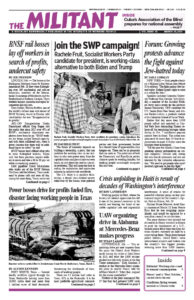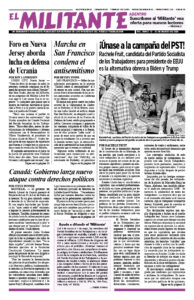Working people in Haiti, where the history of colonial oppression has left it one of the poorest countries in the world, are bearing the brunt of unstable capitalist rule and imperialist interference. A wave of attacks by powerful criminal gangs on key government targets hit the country’s capital, Port-au-Prince, Feb. 29.
Haitian Prime Minister Ariel Henry announced March 12 from Puerto Rico that he was resigning immediately, and would be replaced by a transition council to set elections.
The gang violence had spiraled out of control as Henry traveled to Kenya to push for deployment of a U.N.-backed police force from that East African country, currently on hold by a court ruling there. Thugs have burned police stations, closed Haiti’s main international airports and broken into the country’s two biggest prisons, releasing more than 3,800 inmates, many fellow gang members.
Last year some 5,000 people were killed. After fleeing neighborhoods besieged by gangs, around 200,000 people have been dispersed.
Rival gangs currently control about 80% of Port-au-Prince with roadblocks on all the main roads to and from the capital. On the docks, where electricity has been cut off, dozens of containers holding critical supplies are held up.
Once seen as thugs connected to the police and directed by rival capitalist families, the gang chiefs are now taking over themselves. Jimmy “Barbecue” Cherizier, a former cop and the leading spokesman of the alliance of scores of gangs, claimed, “We are making a bloody revolution.” Their forces have surrounded the National Palace.
Haiti’s economy has contracted for five consecutive years while food inflation is soaring. The cost of a bag of rice, a Haitian staple, has risen from $40 to $120.
Working people in Haiti have long faced intervention by Washington, and, more recently, U.N. troops. They were devastated by earthquakes in 2010 and 2021 and a hurricane in 2016.
Secretary of State Antony Blinken met with government leaders from the Caribbean, North America and Europe in Jamaica on March 11, trying to put a lid on Haiti’s escalating crisis.
Washington’s proposal is for a multinational force — but not U.S. troops — to be deployed to “assist” Haiti’s national police.
With Washington’s backing, Henry had become prime minister in July 2021 after the assassination of President Jovenel Moise. Both ruled by decree.

